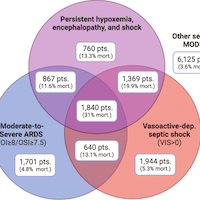Tag: encephalopathy

Pediatric Sepsis Phenotype with Persistent Hypoxemia, Encephalopathy, and Shock
We derived and validated the persistent hypoxemia, encephalopathy, and shock phenotype, which is highly reproducible, clinically relevant, and associated with HTE to common adjuvant therapies in children with sepsis. We... read more

Post-acute Neurological Consequences of COVID-19
COVID-19 and its neurological consequences particularly burden marginalized communities, and so can only be effectively treated by advancing health equity. Our world has witnessed over 275 million confirmed cases of COVID-19... read more

Central and peripheral nervous system complications of COVID-19
CNS and PNS complications were common in hospitalized COVID-19 patients, particularly in the ICU, and often attributable to critical illness. When COVID-19 was the primary cause for neurological disease, no signs of viral... read more

Critical Care Management of Infectious Meningitis and Encephalitis
Central nervous system (CNS) infections represent 2.9% of the infections encountered in the intensive care unit (ICU). Among them, infectious meningitis and encephalitis, regardless of their community or healthcare-associated... read more

Response to optic nerve sheath diameter guided detection of sepsis associated encephalopathy
regarding the blind method, being uninformed of the clinical diagnoses of patients is unavailing, since clues will still be found in patients' clinical manifestations. Therefore, two trained physicians in intensive ultrasound... read more

Infectious Meningitis and Encephalitis in ICU
Infectious meningitis and encephalitis are a major concern in ICU since they are associated with high mortality and permanent neurological injury. About 3% of central nervous system infections will be admitted in the ICU. Three... read more

ICU Delirium Management During SARS-CoV-2 Pandemic
The novel coronavirus, SARS-CoV-2-causing Coronavirus Disease 19 (COVID-19), emerged as a public health threat in December 2019 and was declared a pandemic by the World Health Organization in March 2020. Delirium, a dangerous... read more

Identification of Subclasses of Sepsis that Showed Different Clinical Outcomes and Responses to Amount of Fluid Resuscitation
Sepsis is a heterogeneous disease and identification of its subclasses may facilitate and optimize clinical management. This study aimed to identify subclasses of sepsis and its responses to different amounts of fluid resuscitation.... read more

Artificial Liver Support in Acute and Acute-on-Chronic Liver Failure
Liver support systems such as MARS and TPE may temporarily improve systemic hemodynamics and the degree of encephalopathy. However, TPE is the only procedure that improves survival in patients with ALF. The role of TPE in... read more

Potentially modifiable factors contributing to sepsis-associated encephalopathy
Acute renal failure and common metabolic disturbances represent potentially modifiable factors contributing to sepsis-associated encephalopathy. However, a true causal relationship has yet to be demonstrated. Our study confirms... read more

Protocol-based Invasive Intracranial Pressure Monitoring in Acute Liver Failure
Acute liver failure (ALF) may result in elevated intracranial pressure (ICP). While invasive ICP monitoring (IICPM) may have a role in ALF management, these patients are typically coagulopathic and at risk for intracranial... read more




